- within Antitrust/Competition Law and Immigration topic(s)
 This year marks the fiftieth
anniversary of the premiere of the original series of Star Trek, which first aired on NBC in
September 1966. On July 22, this milestone will be marked in
earnest when Paramount Pictures releases the new film, Star Trek Beyond (which sadly includes
the final Chekovian performance by the recently-departed Anton Yelchin).
This year marks the fiftieth
anniversary of the premiere of the original series of Star Trek, which first aired on NBC in
September 1966. On July 22, this milestone will be marked in
earnest when Paramount Pictures releases the new film, Star Trek Beyond (which sadly includes
the final Chekovian performance by the recently-departed Anton Yelchin).
The Trademark and Copyright Law Blog is commemorating this anniversary by recounting the history of Star Trek-related litigation, with an emphasis on trademark and copyright matters. We found dozens of disputes related (or kind-of-related) to the science fiction franchise, and picked fifty of them, one for each candle on the birthday cake. They are presented below in chronological order, so if you're just here to read about Axanar, you've got a lot of scrolling to do.
Oh, and in case you didn't get it, the title of this article is a pun on Spock's "The needs of the many outweigh the needs of the few . . . " quote from Star Trek II: The Wrath of Khan. If you still don't get it, this may be a tough read for you.
1. In re Request for Waiver of Prime Time Access Rule (FCC 1974). The very first mention we found of Star Trek in a litigation context was a 1974 administrative petition to the Federal Communications Commission by an Ohio television station. The station was going through financial difficulties, and wanted a waiver of the Prime Time Access Rule, which had been promulgated in 1970 to limit the amount of network programming aired each day. With this waiver, the station hoped to broadcast the ad-revenue-generating Star Trek series from 6:30-7:30 pm on weekdays instead of -ick!- local programming. The FCC refused to grant the waiver.
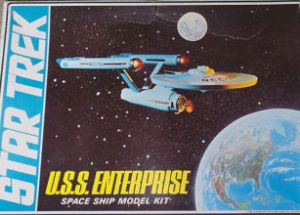 2. In re Lesney Products
Corporation (CARU 1980). Lesney Products (the original "Matchbox" car maker) advertised a Star
Trek Enterprise model kit in the "Star Trek the Motion Picture" comic book.
The Children's Advertising Review Unit (CARU)
of the Better Business Bureau expressed concern that the
advertisement might be mistaken for editorial content, and also
found that the image of the Enterprise in the ad looked too good,
i.e., it didn't accurately represent the model. Lesney agreed
to correct its advertisements.
2. In re Lesney Products
Corporation (CARU 1980). Lesney Products (the original "Matchbox" car maker) advertised a Star
Trek Enterprise model kit in the "Star Trek the Motion Picture" comic book.
The Children's Advertising Review Unit (CARU)
of the Better Business Bureau expressed concern that the
advertisement might be mistaken for editorial content, and also
found that the image of the Enterprise in the ad looked too good,
i.e., it didn't accurately represent the model. Lesney agreed
to correct its advertisements.
3. Clarks of England, Inc. v. Glen Shoe (S.D.N.Y. 1980). In 1980, Clarks of England, makers of TREK shoes, obtained the license to produce STAR WARS-branded sneakers for children. Around the same time, the Glen Shoe Company announced its own line of licensed STAR TREK-branded shoes for children (alongside its WONDERWOMAN and MORK AND MINDY brands). This was doubly troubling to Clarks: not only was Glen Shoe competing in the sci-fi footwear space, but it was incorporating the word "trek" to do it. Clarks brought suit in the Southern District of New York and sought to enjoin the sale of STAR TREK shoes. The Southern District of New York denied the motion, holding that Clark's TREK shoes (which were made for adults) and Glen Shoe's STAR TREK shoes (made for kids and sold in association with images of Mr. Spock and the Starship Enterprise) did not compete with each other, and therefore there was no likelihood of confusion.
4. Paramount Pictures v. Rubinowitz (E.D.N.Y. 1981). Les Rubinowitz was selling unauthorized cassette tape copies of Star Trek episodes until he got caught by Paramount, which brought suit against him for copyright infringement. Rubinowitz argued in his defense that the entire original series had fallen into the public domain because its pre-1978 exhibition on television stations nationwide had been a "general publication" without the copyright notices required by the 1909 Copyright Act. The Eastern District of New York disagreed and found that distribution to television stations under express licensing restrictions was a "limited publication," not a "general publication," and therefore syndication did not operate to place the series in the public domain.
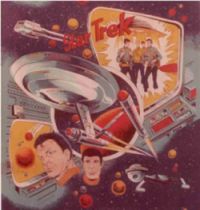 5. In re Paramount
Pictures (TTAB 1983). A trademark examiner refused
registration of STAR TREK for official towels and bedsheets
depicting scenes from the television series, on the ground that
consumers would see the use of STAR TREK on the product not as a
source identifier but as mere ornament to help identify the scenes
and characters depicted. The TTAB held that the examiner's view
of the law was "unrealistically narrow," and that the
STAR TREK mark operated to indicate sponsorship by a common source,
because "even the most naïve adult should be aware that
the owners of as well known a mark as STAR TREK would not sit idly
by and allow a third party to blithely trade on the good will it
has built into its mark."
5. In re Paramount
Pictures (TTAB 1983). A trademark examiner refused
registration of STAR TREK for official towels and bedsheets
depicting scenes from the television series, on the ground that
consumers would see the use of STAR TREK on the product not as a
source identifier but as mere ornament to help identify the scenes
and characters depicted. The TTAB held that the examiner's view
of the law was "unrealistically narrow," and that the
STAR TREK mark operated to indicate sponsorship by a common source,
because "even the most naïve adult should be aware that
the owners of as well known a mark as STAR TREK would not sit idly
by and allow a third party to blithely trade on the good will it
has built into its mark."
6. St. Louis Science Fiction Limited v. Commissioner (U.S. Tax Ct. 1985). The Commissioner of Internal Revenue rejected St. Louis Science Fiction's application for 501(c)(3) status as an educational organization, on the ground that the annual sci-fi convention the entity ran was a non-exempt entertainment event. The Tax Court found that viewings of "Star Trek Blooper" reels were not educational, and affirmed.
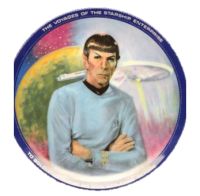 7. In re Hamilton
Group (NAD 1987). In 1984, the Hamilton Group issued "limited
edition" Star Trek collector plates, including one of Mr.
Spock. Hamilton claimed:
7. In re Hamilton
Group (NAD 1987). In 1984, the Hamilton Group issued "limited
edition" Star Trek collector plates, including one of Mr.
Spock. Hamilton claimed:
Mr. Spock will be issued utilizing a firing period of 90 days only, and when the edition closes, it can never be reopened . . . only this one single edition will be issued, and once the firing period is complete, the transfer masters will be destroyed . . after which no more Mr. Spock plates ever can be made.
Despite these claims, Hamilton put more Mr. Spock "limited-edition" plates up for sale in 1987, and a consumer complained to the National Advertising Division (NAD) of the Better Business Bureau. Hamilton explained that, pusuant to industry custom, a "90 day firing period" does not necessarily mean ninety consecutive days, so the 1987 plates were fired within the original period even though three years had passed. Nevertheless, Hamilton offered to refund the cost to the consumer, and agreed to be clearer about the meaning of terms like "firing period" in the future.
8. In re Lewis Galoob Toys (CARU 1988). Galoob Toys' television advertisements for Star Trek action figures were great! The figures moved their arms all by themselves, and their phasers fired lights as bright lightning bolts. The problem was – the toys themselves had neither feature. On the recommendation of the Children's Advertising Review Unit of the Better Business Bureau, the company agreed to edit these scenes and make other clarifying disclosures.
 9. Paramount Pictures v.
Romulan Invasions (TTAB 1988). James White is the
front man for The Romulans, a California punk band formed in
1982. The name derives from a combination of "Romulus"
and "Roman," meant as a political commentary comparing
the politics of ancient Rome with the politics of the 1980's.
When White attempted to register the band's name and logo as a
trademark in 1983, Paramount opposed. The TTAB rejected Paramount's opposition and
allowed the registration. Although Paramount had sold various
products based on the Star Trek alien race called the Romulans
(such as model ship version of the Romulan Birds of Prey), the TTAB found that it
had not used the term as a trademark, and that there was no
likelihood of confusion with the band.
9. Paramount Pictures v.
Romulan Invasions (TTAB 1988). James White is the
front man for The Romulans, a California punk band formed in
1982. The name derives from a combination of "Romulus"
and "Roman," meant as a political commentary comparing
the politics of ancient Rome with the politics of the 1980's.
When White attempted to register the band's name and logo as a
trademark in 1983, Paramount opposed. The TTAB rejected Paramount's opposition and
allowed the registration. Although Paramount had sold various
products based on the Star Trek alien race called the Romulans
(such as model ship version of the Romulan Birds of Prey), the TTAB found that it
had not used the term as a trademark, and that there was no
likelihood of confusion with the band.
10. Paramount Pictures v. Video Broadcasting System, (D. Kan. 1989). Video Broadcasting Systems of Wichita, Kansas hit upon the bright idea of selling ad space before the "FBI warning" on rented movies. They collected local ads from Kansas businesses (such as Domino's Pizza franchisees) and convinced video store owners to let them record the ads on to the beginning of VHS rentals, including Star Trek films. Paramount brought suit for copyright infringement and infringement of the PARAMOUNT and STAR TREK trademarks. On Paramount's motion for a preliminary injunction, the District of Kansas rejected the argument that the public necessarily perceived a rented videotape of a Star Trek film to contain only Paramount-created productions, particularly in the absence of evidence of actual confusion. As to the copyright claims, the Court disagreed with Paramount that the edited videotapes constituted infringing derivatives of the original film. The preliminary injunction was denied, and the case ultimately settled.
 11. Green v.
Lindsey (SDNY 1992). The author of what the Southern
District of New York called a "bodice-ripping" science
fiction novel, The Warrior Within, sued the
author of ADD PHOTOWarrior's Women (ADD PHOTO
described on Amazon.com as "boldly go[ing] where no romantic
fiction has gone before") for copyright infringement.
Each novel tells the story of a space traveling woman who gets it
on with a hunky primitive barbarian warrior. Plaintiff argued,
among other things, that there was a substantial similarity between
her story's "Central Amalgamation" of planets and the
defendant's "Centura League of Confederated Planets."
But in the Court's view, Star Trek's Federation of
Planets had beat them both to the punch and, in any case, the idea
of a "league of planets" was a basic, science-fiction
convention not protectable by copyright. The case was dismissed and Second Circuit summarily
affirmed.
11. Green v.
Lindsey (SDNY 1992). The author of what the Southern
District of New York called a "bodice-ripping" science
fiction novel, The Warrior Within, sued the
author of ADD PHOTOWarrior's Women (ADD PHOTO
described on Amazon.com as "boldly go[ing] where no romantic
fiction has gone before") for copyright infringement.
Each novel tells the story of a space traveling woman who gets it
on with a hunky primitive barbarian warrior. Plaintiff argued,
among other things, that there was a substantial similarity between
her story's "Central Amalgamation" of planets and the
defendant's "Centura League of Confederated Planets."
But in the Court's view, Star Trek's Federation of
Planets had beat them both to the punch and, in any case, the idea
of a "league of planets" was a basic, science-fiction
convention not protectable by copyright. The case was dismissed and Second Circuit summarily
affirmed.
12. In re Party Masters, Inc. (Bankr. N.D. Ill. 1992). Dreamwerks Productions, a company that organized Star Trek conventions, entered into an oral agreement whereby Party Masters would become its ticket sales agent for conventions in the midwest. But before it could remit certain funds to Dreamwerks, Party Masters filed a Chapter 11 petition in which Dreamwerks was not listed as a creditor. Dreamwerks sued to recover the unremitted funds and to enjoin Party Masters from continuing use of the DREAMWERKS mark. The Northern District of Illinois Bankruptcy Court, which granted Dreamwerks most of the relief it sought, couldn't resist the following introduction to its opinion:
[T]his action is the voyage of two Star Trek convention promoters into litigation before this bankruptcy court; they explore and mix strange legal theories and ask the Court to seek out justice and do equity in this lawsuit of their creation; they boldly go where very few wise litigants have gone before — both parties assert contradictory and conflicting theories based on oral contract. Like the Star Trek characters battling in outer space, these parties struggle in the inner void left by their mutual failure to write down and document the terms of their agreement.
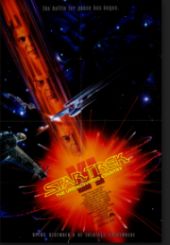 13. Segal v. Paramount
Pictures (E.D. Pa. 1993). In 1983, the plaintiff
submitted an unsolicited screenplay to Paramount, entitled Star
Trek IV: Inside the Klingon Empire. Although Paramount
declined the submission, the plaintiff alleged that the 1991 film,
Star Trek VI: The Undiscovered
Country, was copied from his script. The Eastern
District of Pennsylvania found that, while the two works were
similar in several respects, these similarities were based on the
fact that both were based on previous Star Trek works.
Additionally, the Court found that the overall plots were the
"opposites of expression" because, while the Paramount
film was a "swords into plowshares" metaphor for the cold
war, the plaintiff's work was a story of violent confrontation.
Summary judgment was granted for
Paramount.
13. Segal v. Paramount
Pictures (E.D. Pa. 1993). In 1983, the plaintiff
submitted an unsolicited screenplay to Paramount, entitled Star
Trek IV: Inside the Klingon Empire. Although Paramount
declined the submission, the plaintiff alleged that the 1991 film,
Star Trek VI: The Undiscovered
Country, was copied from his script. The Eastern
District of Pennsylvania found that, while the two works were
similar in several respects, these similarities were based on the
fact that both were based on previous Star Trek works.
Additionally, the Court found that the overall plots were the
"opposites of expression" because, while the Paramount
film was a "swords into plowshares" metaphor for the cold
war, the plaintiff's work was a story of violent confrontation.
Summary judgment was granted for
Paramount.
14. Paramount Pictures v. Star Base 21 Book Shop (N.D. Ill. 1995). In 1994, an Oklahoma comic book dealer somehow got a hold of rough draft scripts for Star Trek: Voyager (which was not slated to premiere until 1995) and sold them at a Star Trek convention in Illinois. When Paramount brought suit in Illinois, the comic book dealer filed a motion to dismiss for lack of personal jurisdiction. The Northern District of Illinois held that if the defendant could get himself up to Illinois to sell the scripts, he could get up to Illinois for his court dates, and denied the motion. The parties later settled for $7,000 in damages.
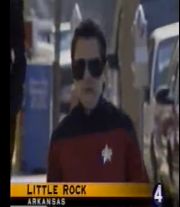 15. United States v.
McDougal (E.D. Ark. 1996). This 1996 case's
connection to Star Trek is tenuous, but far too famous to omit. On
the first day of the Whitewater trial, a blockbuster media event
involving criminal fraud charges against the former business
associates of a sitting President, alternate juror Barbara Adams
showed up to court wearing a Star Fleet uniform, complete with
phaser and tricorder. "I always wear my uniform to formal
occasions," she explained. Neither the prosecution nor the
defense objected to Adams' presence until – days into the
trial – she started giving interviews to the media. Judge
George Howard dismissed Adams from jury service. The defendants
were later found the guilty on several counts.
15. United States v.
McDougal (E.D. Ark. 1996). This 1996 case's
connection to Star Trek is tenuous, but far too famous to omit. On
the first day of the Whitewater trial, a blockbuster media event
involving criminal fraud charges against the former business
associates of a sitting President, alternate juror Barbara Adams
showed up to court wearing a Star Fleet uniform, complete with
phaser and tricorder. "I always wear my uniform to formal
occasions," she explained. Neither the prosecution nor the
defense objected to Adams' presence until – days into the
trial – she started giving interviews to the media. Judge
George Howard dismissed Adams from jury service. The defendants
were later found the guilty on several counts.
16. Rodenberry v. Rodenberry (Cal. App. 1996). Star Trek creator Gene Roddenberry divorced his wife Elaine in 1969, just around the time the original series ended. As part of the mostly hand-written divorce agreement, Elaine was allocated a one-half interest in future profit participation income from "Star Trek." The original series was considered a commercial failure, so at the time the definition of "Star Trek" was probably not a contentious issue. However, after the divorce, Star Trek started becoming a financial success, including through merchandising, films and new television series. Elaine brought suit against Rodenberry's estate (which was administered by his widow and second wife, Majel Barrett aka Nurse Chapel aka Lwaxana Troi), claiming that, because she owned a piece of "Star Trek," she owned a piece of all of the subsequent television shows, movies and merchandising. The trial court disagreed with respect to the movies and merchandise, but agreed that Elaine was due some of the profits from The Next Generation and Deep Space Nine, because these were "continuations" of the original series. However, the Court of Appeals reversed, finding it unlikely that the parties intended their agreement to include (what were at the time unimaginable) sequel television series, because "never before had a financially failed television series enjoyed such subsequent popularity." Therefore, only the profits from the original series were anticipated in the contract and due to Elaine.
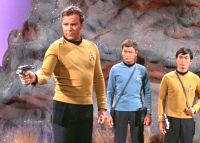 17. Paramount Pictures v.
Coyle (D. Ariz. 1997). Richard Coyle
was a television repairman until his amateur props were spotted at
a Star Trek convention, and he was asked to create props for
Star Trek II: Wrath of Khan, and later for other Star
Trek films and television series. However, Paramount frowned
on Coyle selling unlicensed phaser replicas at conventions, and
brought suit against him, leading to a consent judgment and
injunction against Coyle. Coyle's online magazine about special
effects prop is available here.
17. Paramount Pictures v.
Coyle (D. Ariz. 1997). Richard Coyle
was a television repairman until his amateur props were spotted at
a Star Trek convention, and he was asked to create props for
Star Trek II: Wrath of Khan, and later for other Star
Trek films and television series. However, Paramount frowned
on Coyle selling unlicensed phaser replicas at conventions, and
brought suit against him, leading to a consent judgment and
injunction against Coyle. Coyle's online magazine about special
effects prop is available here.
18. White v. Paramount Pictures (Fed. Cir. 1997). Following his successful registration of THE ROMULANS for his punk band (see above), James White created "The Romulans' connect the dots" game, which he gave away for free or sold for between 25 cents and a dollar. In 1991, he decided to expand his trademark portfolio by filing an application with the USPTO to register THE ROMULANS for "parlor games, namely connect the dots game sets." Paramount's opposition against White fared better this time: the registration was rejected on the grounds that the game was a token use of the mark and not a bona fide use in commerce. The Federal Circuit affirmed.
 19. Paramount Pictures v.
Custom Wood Designs (D. Colo. 1997). Kenneth Manning
of Denver, Colorado reportedly sold about 800 bat-wing-shaped
swords, at $235 a pop, until Paramount brought suit, alleging that
they were virtually identical reproductions of Klingon Bat'Leths. As part of a consent judgment,
Manning agreed to destroy his remaining inventory.
19. Paramount Pictures v.
Custom Wood Designs (D. Colo. 1997). Kenneth Manning
of Denver, Colorado reportedly sold about 800 bat-wing-shaped
swords, at $235 a pop, until Paramount brought suit, alleging that
they were virtually identical reproductions of Klingon Bat'Leths. As part of a consent judgment,
Manning agreed to destroy his remaining inventory.
Coincidentally, Colorado is also home to the only known Bat'leth-aided robberies. In March 2016, a masked man carrying a Bat'leth robbed two 7-Elevens in Colorado Springs in less than an hour.
20. 800 Trekker v. Axis Web Development (E.D. Pa. 1998). Back in the pre-internet days, 800 Trekker sold Star Trek merchandise by mail-order catalogue. Just as the company was entering ecommerce by setting up an AOL store, they noticed to their horror that the URL 800trekker.com was not only taken, but that visitors to the site were immediately assaulted by pornographic images and the tagline: "Your trek for the finest online adult entertainment is over." 800 Trekker brought a trademark infringement suit against the operators of the site, and the domain was duly transferred to the plaintiff by consent decree.
 21. Foote v. Franklin
Mint (N.D. Tex. 1998). When Andrew Bartmess first read the Starfleet Technical Manual,
he was fascinated by the tri-dimensional chessboard featured in the
series. In 1977, when the 1909 Copyright Act was still in force,
Bartmess created and published rules for the game so that it could
actually be played. The rules were distributed or sold at Star Trek
conventions and in fan literature, often without a copyright
notice. When the Franklin Mint started selling replica Star Trek chess sets in 1994, a copy
of Bartmess' rules was included with each set. Bartmess'
successor in interest brought a copyright infringement suit in the
Northern District of Texas. The Court granted summary judgment for the Franklin
Mint, finding that Bartmess' early publications manifested an
intent to cede all rights to the work.
21. Foote v. Franklin
Mint (N.D. Tex. 1998). When Andrew Bartmess first read the Starfleet Technical Manual,
he was fascinated by the tri-dimensional chessboard featured in the
series. In 1977, when the 1909 Copyright Act was still in force,
Bartmess created and published rules for the game so that it could
actually be played. The rules were distributed or sold at Star Trek
conventions and in fan literature, often without a copyright
notice. When the Franklin Mint started selling replica Star Trek chess sets in 1994, a copy
of Bartmess' rules was included with each set. Bartmess'
successor in interest brought a copyright infringement suit in the
Northern District of Texas. The Court granted summary judgment for the Franklin
Mint, finding that Bartmess' early publications manifested an
intent to cede all rights to the work.
22. Dreamwerks Prod. Group v. SKG Studio (9th 1998). As noted above, Dreamwerks Productions, founded in 1984, organized Star Trek conventions, and was not too happy when a new movie studio emerged in 1994 calling itself DreamWorks. "Pshaw, you might say," stated Judge Alex Kozinski in his unmistakable style, "what could be better for Dreamwerks than to have people confuse it with a mega movie studio?" Well, that's not the way Dreamwerks felt, and it initiated a trademark infringement action in California. The District Court found that there was no likelihood of confusion owing to Dreamwerks' relatively narrow niche. However, the Ninth Circuit reversed and remanded. The case later settled, and Dreamwerks subsequently abandoned its registration.
 23. May v. Paramount
Pictures (9th Cir. 1998). The plaintiff, likely
motivated by the opening of Star Trek: The Experience at the Las
Vegas Hilton, brought a pro se complaint (one of many),
alleging that Paramount had misappropriated his idea for a Star
Trek-themed hotel, thus infringing his copyrights, trademarks
and a bunch of other rights. Dismissal was summarily affirmed by
the Ninth Circuit.
23. May v. Paramount
Pictures (9th Cir. 1998). The plaintiff, likely
motivated by the opening of Star Trek: The Experience at the Las
Vegas Hilton, brought a pro se complaint (one of many),
alleging that Paramount had misappropriated his idea for a Star
Trek-themed hotel, thus infringing his copyrights, trademarks
and a bunch of other rights. Dismissal was summarily affirmed by
the Ninth Circuit.
24. Securities and Exchange Commission v. California Laser Company (C.D. Cal. 1999). The SEC filed an emergency lawsuit to freeze the assets of the California Laser Company, a holographic projector manufacturer. The SEC alleged that the company's founder, Nicholas Geranio, misappropriated over $400,000 in investor funds to buy jewelry for his wife, to pay for his mortgage and to fund his "Midget" car racing hobby. Even worse, the SEC alleged that the company deceived investors into believing that James Doohan had endorsed the company. Geranio hit back with a press release, stating that "I hired James Doohan (who played "Scotty" in the original Star Trek television series) to promote our holographic product line and would have been happy to provide a copy of the executed agreement to the SEC if they had asked." The record available to us doesn't disclose who was right on this point, but Geranio later settled and was ordered to pay back over $2 million to investors.
 25. Paramount Pictures v.
Carol Publishing (2d Cir. 1999). In 1998, Paramount
brought suit against the publisher of The Joy of Trek, a
book meant to explain the Star Trek phenomenon to non-Trekkies who
found themselves dating Trekkies. Included in the book were
synopses of Star Trek storylines, descriptions of characters, and a
smattering of quotes from the show ("make it so,"
"live long and prosper," etc...). The Southern District of New York found that,
because the book was basically retelling the essential elements of
the plots (albeit in different — but not transformative
— order), there were substantial similarities between the
book and the Star Trek franchise materials that inspired it. The
Court granted an injunction against further
publication of the book, and the Second Circuit affirmed.
25. Paramount Pictures v.
Carol Publishing (2d Cir. 1999). In 1998, Paramount
brought suit against the publisher of The Joy of Trek, a
book meant to explain the Star Trek phenomenon to non-Trekkies who
found themselves dating Trekkies. Included in the book were
synopses of Star Trek storylines, descriptions of characters, and a
smattering of quotes from the show ("make it so,"
"live long and prosper," etc...). The Southern District of New York found that,
because the book was basically retelling the essential elements of
the plots (albeit in different — but not transformative
— order), there were substantial similarities between the
book and the Star Trek franchise materials that inspired it. The
Court granted an injunction against further
publication of the book, and the Second Circuit affirmed.
26. West Boylston Cinema Corp. v. Paramount Pictures Corp. (Mass. Super. 2000). Allegedly responding to Paramount's invitation, a movie theater outside Worcester submitted a $20,000 bid for the first run of the latest Star Trek The bid was returned unopened and the film went to another theatre. The parties were already in the midst of an antitrust dispute, and the theatre argued that this behavior violated the Massachusetts Blind Bidding Act, which required that "once bids are solicited" the film must be licensed through bidding and the bids must be opened. Paramount argued that the bidding statute was preempted by the Copyright Act, which expressly affords a distribution right to the copyright holder. The Court disagreed that there was a conflict between the state and federal statutes, and refused to grant Paramount summary judgment on this count.
 27. Don Post Studios v.
Cinema Secrets (E.D. Pa. 2000). In 1978, Don Post was
approached by the makers of the film Halloween to design a
mask for the character Michael Myers to wear. The
Halloween producers specifically requested that the mask
be based on the foam master of William Shatner that Post had
earlier used for an official Captain Kirk mask. Post pulled Shatner
off the shelf, modified it a bit and: Voila, serial killer! In
return, Post received $150. When the Halloween film series
became a hit, Post began selling "Don Post the Mask," a
nearly identical product also based on the Shatner mold. When the
film producers began licensing their own official
Halloween masks, Post filed copyright infringement claims
to stop them. The Court held that Post's copyright in
"Don Post the Mask" was invalid for lack of originality
– it was just a copy of Mr. Shatner's head, and also a
copy of the mask as it appeared in the film. The Court also
rejected Post's trade dress claims because his mask had not
achieved secondary meaning independent of the film.
27. Don Post Studios v.
Cinema Secrets (E.D. Pa. 2000). In 1978, Don Post was
approached by the makers of the film Halloween to design a
mask for the character Michael Myers to wear. The
Halloween producers specifically requested that the mask
be based on the foam master of William Shatner that Post had
earlier used for an official Captain Kirk mask. Post pulled Shatner
off the shelf, modified it a bit and: Voila, serial killer! In
return, Post received $150. When the Halloween film series
became a hit, Post began selling "Don Post the Mask," a
nearly identical product also based on the Shatner mold. When the
film producers began licensing their own official
Halloween masks, Post filed copyright infringement claims
to stop them. The Court held that Post's copyright in
"Don Post the Mask" was invalid for lack of originality
– it was just a copy of Mr. Shatner's head, and also a
copy of the mask as it appeared in the film. The Court also
rejected Post's trade dress claims because his mask had not
achieved secondary meaning independent of the film.
28. Paramount Pictures v. Cukr (D. Colo. 2000). Colorado sci-fi artist James Cukr was selling Star Trek-inspired original paintings for as much as $10,000 a pop, apparently pursuant to a contract between Paramount and Lightspeed Fine Arts. Cukr allegedly exceeded the terms of the license by creating and selling additional paintings. Paramount brought suit, leaving the fate of "Vengeance," an $8,500 painting of Captain Kirk and Ricardo Montalban's Kahn Singh, temporarily stranded on Ceti Alpha V. The case ended in a consent judgment and injunction against Cukr. You can still find prints of his works for sale on eBay and elsewhere.
 29. Universal Studios v.
Paramount Parks (C.D. Cal. 2000). Universal Studios
brought suit against Paramount Parks over an
interactive simulator at the $70 million Star Trek: The Experience in Las
Vegas. Universal claimed that the ride infringed its patent in a domed projection screen and moving
vehicle combination that created the illusion of being inside an
action-adventure movie. After Hilton's motion to dismiss was
denied, the parties settled.
29. Universal Studios v.
Paramount Parks (C.D. Cal. 2000). Universal Studios
brought suit against Paramount Parks over an
interactive simulator at the $70 million Star Trek: The Experience in Las
Vegas. Universal claimed that the ride infringed its patent in a domed projection screen and moving
vehicle combination that created the illusion of being inside an
action-adventure movie. After Hilton's motion to dismiss was
denied, the parties settled.
30. In re: Star Trek: The Experience (NLRB 2001). A member of the Culinary Workers Union and employee at Star Trek: The Experience brought a cake to work on her last day. The cake was decorated as a union authorization card and inscribed "Goodbye Norma Rae" in icing. Although other treats had been allowed in similar circumstances, the employee was instructed to "smear the cake over" because it was inappropriate for the workplace. When she refused, a supervisor confiscated the cake. An Administrative Law Judge found that the confiscation was lawful because the cake should not have been in a work area in the first place. However, the National Labor Relations Board reversed because the sole reason for the confiscation of the cake was to remove a pro-union message, in violation of Section 8(a)(1) of the National Labor Relations Act. Future cake-fiscations were enjoined.
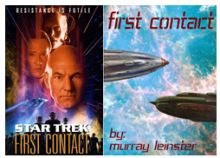 31. Evans v. Paramount
Pictures (4th 2001). The heirs of sci-fi
writer Murray Leinster (born William Jenkins) claimed
that the 1996 film Star Trek: First Contact, violated
trademark rights associated with Leinster's 1945 novella,
First Contact, which is credited as introducing the
"universal translator" to science fiction, and which won
a retrospective Hugo Award in 1996. The Eastern
District of Virginia found that the phrase "First
Contact" as applied to alien encounters may very well have
originated with Leinster in 1945. However, since that time it had
become a generic way "to describe an entire genre of science
fiction, namely literature about humankind's first encounter
with extraterrestrial life." Even if it wasn't generic,
the Court held, it also had not achieved secondary meaning.
Paramount was granted summary judgment and the Fourth Circuit affirmed.
31. Evans v. Paramount
Pictures (4th 2001). The heirs of sci-fi
writer Murray Leinster (born William Jenkins) claimed
that the 1996 film Star Trek: First Contact, violated
trademark rights associated with Leinster's 1945 novella,
First Contact, which is credited as introducing the
"universal translator" to science fiction, and which won
a retrospective Hugo Award in 1996. The Eastern
District of Virginia found that the phrase "First
Contact" as applied to alien encounters may very well have
originated with Leinster in 1945. However, since that time it had
become a generic way "to describe an entire genre of science
fiction, namely literature about humankind's first encounter
with extraterrestrial life." Even if it wasn't generic,
the Court held, it also had not achieved secondary meaning.
Paramount was granted summary judgment and the Fourth Circuit affirmed.
 32. Carafano v.
Metrosplash (9th Cir. 2002). Deep Space Nine Dabo girl Christianne Carafano (professionally
known as Chase Masterson) was unpleasantly surprised to
learn she had a fake profile on Matchmaker.com, which had been
posted by an anonymous user in Germany. The profile included
pictures of Carafano, her home address and telephone number, and
purported descriptions of her sexual preferences (e.g.,
"looking for a one-night stand" and "liked sort of
being controlled by a man, in and out of bed"). Carafano soon
started receiving sexually explicit and threatening phone calls, as
well as well-meaning but unwanted communications from Star Trek
fans. She filed suit against Matchmaker.com for defamation and
invasion of privacy, but the District Court dismissed the claims
and the Ninth Circuit Even though much of the
offending information was provided in response to questions posed
by the website's form templates (name, address, etc.), that
alone did not make Matchmaker.com an "information content
provider." The website was thus immune from suit under Section 230 of the Communications Decency Act,
despite what the Court referred to as the "utterly deplorable
consequences" of such immunity.
32. Carafano v.
Metrosplash (9th Cir. 2002). Deep Space Nine Dabo girl Christianne Carafano (professionally
known as Chase Masterson) was unpleasantly surprised to
learn she had a fake profile on Matchmaker.com, which had been
posted by an anonymous user in Germany. The profile included
pictures of Carafano, her home address and telephone number, and
purported descriptions of her sexual preferences (e.g.,
"looking for a one-night stand" and "liked sort of
being controlled by a man, in and out of bed"). Carafano soon
started receiving sexually explicit and threatening phone calls, as
well as well-meaning but unwanted communications from Star Trek
fans. She filed suit against Matchmaker.com for defamation and
invasion of privacy, but the District Court dismissed the claims
and the Ninth Circuit Even though much of the
offending information was provided in response to questions posed
by the website's form templates (name, address, etc.), that
alone did not make Matchmaker.com an "information content
provider." The website was thus immune from suit under Section 230 of the Communications Decency Act,
despite what the Court referred to as the "utterly deplorable
consequences" of such immunity.
33. Paramount Pictures v. Does 1 Through 100 (N.D. Ohio 2002). In advance of the "Vulkon" science fiction convention in Cleveland, Paramount brought copyright and trademark infringement claims against the unofficial Star Trek merchandise dealers who were shipping goods into Ohio in anticipation of the event. The Northern District of Ohio authorized U.S. Marshalls to seize the offending goods, and later issued a permanent injunction. Accompanying the complaint was a nifty alphabetical list of registered Star Trek-related trademarks as of 2002.
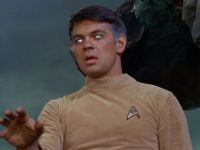 34. Thane v. Trek
Bicycle, (9th 2002). Trek Bicycle, which
had been using the TREK mark since 1977, brought a trademark
infringement action against Thane International, which was
marketing an indoor eliptical exercise machine under the mark
ORBITREK. Thane's executive vice president (actress Denise DuBarry) argued that the inspiration for
the name had nothing to do with Trek Bicylcle, but was rather a
tribute to her ex-husband, actor Gary Lockwood, who portrayed Lieutenant
Commander Gary Mitchell in the Star Trek pilot, Where No Man Has Gone Before (he's
the one whose eyes went all silvery when he obtained super powers).
The District Court granted Thane summary judgment, but the Ninth Circuit reversed, holding that the
District Court had not given sufficient weight to Trek's
evidence of actual confusion, and remanding the matter for jury
trial. The case settled just before trial.
34. Thane v. Trek
Bicycle, (9th 2002). Trek Bicycle, which
had been using the TREK mark since 1977, brought a trademark
infringement action against Thane International, which was
marketing an indoor eliptical exercise machine under the mark
ORBITREK. Thane's executive vice president (actress Denise DuBarry) argued that the inspiration for
the name had nothing to do with Trek Bicylcle, but was rather a
tribute to her ex-husband, actor Gary Lockwood, who portrayed Lieutenant
Commander Gary Mitchell in the Star Trek pilot, Where No Man Has Gone Before (he's
the one whose eyes went all silvery when he obtained super powers).
The District Court granted Thane summary judgment, but the Ninth Circuit reversed, holding that the
District Court had not given sufficient weight to Trek's
evidence of actual confusion, and remanding the matter for jury
trial. The case settled just before trial.
35. People v. Bivens (Cal. App. 2003). Star Trek: Deep Space Nine actor Armin Shimerman and his wife were taking a walk in Los Angeles when they robbed, in violation of the Ferengi Rules of Acquisition and in alleged violation California criminal law. Later that night, the defendant was arrested while carrying Shimerman's driver's license and credit cards. After the defendant's trial had started, a juror reminded the judge that she was scheduled to go on vacation the next day, and the judge offered to excuse her if a verdict was not reached by noon. After he was convicted, the defendant appealed, arguing that the judge had introduced an extraneous consideration into the jury deliberations. The California Appeals Court rejected this argument and affirmed the conviction.
 36. Paramount Pictures v.
Buy this Domain (WIPO 2003). Paramount initiated a
UDRP domain name proceeding to wrestle startrekarmada.com and
startrekarmada2.com from an anti-abortion group that had redirected
the domains to abortionismurder.org. The panel ordered that the domains be transferred,
finding that the respondent had no legitimate interest in the STAR
TREK ARMADA mark (the name of a Star Trek-branded game), and that
the "extraordinary fame and success of the STAR TREK
properties demonstrates that respondent's registrations alone
constitute bad faith."
36. Paramount Pictures v.
Buy this Domain (WIPO 2003). Paramount initiated a
UDRP domain name proceeding to wrestle startrekarmada.com and
startrekarmada2.com from an anti-abortion group that had redirected
the domains to abortionismurder.org. The panel ordered that the domains be transferred,
finding that the respondent had no legitimate interest in the STAR
TREK ARMADA mark (the name of a Star Trek-branded game), and that
the "extraordinary fame and success of the STAR TREK
properties demonstrates that respondent's registrations alone
constitute bad faith."
37. Disney v. Delane (D. Md. 2006). In 2005, a group of television studios brought copyright infringement claims against the operators of a website that facilitated unauthorized BitTorrent downloads of various programs. The defendants defaulted and the District of Maryland granted plaintiffs statutory damages with one exception: Star Trek: Enterprise, Episode 4-11, "Observer Effect" was not registered until after infringement commenced, and therefore this infringement could not give rise to statutory damages.
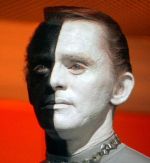 38. Estate of Frank
Gorshin v. Martin (WIPO 2005). Frank Gorshin is known to Baby Boomers as an
impressionist on the Ed Sullivan Show, to Gen-Xers as the
Riddler opposite Adam West's
Batman, and to Trekkies as that creepy half-white,
half-back alien who was prejudiced against the half-black,
half-white aliens that shared his doomed planet in Let That Be Your Last
Battlefield. Gorshin passed away in 2005, and his
widow decided to register frankgorshin.com, but found it was
already taken by a Star Trek collectibles dealer in Walla Walla,
Washington, who was describing the domain as the "official
Frank Gorshin Web site." When Gorshin's estate initiated a
UDRP domain name proceeding, the dealer claimed to have entered
into an agreement with Gorshin during his life. However, he failed
to produce evidence of the agreement to the WIPO panel, which ordered that the domain be
transferred.
38. Estate of Frank
Gorshin v. Martin (WIPO 2005). Frank Gorshin is known to Baby Boomers as an
impressionist on the Ed Sullivan Show, to Gen-Xers as the
Riddler opposite Adam West's
Batman, and to Trekkies as that creepy half-white,
half-back alien who was prejudiced against the half-black,
half-white aliens that shared his doomed planet in Let That Be Your Last
Battlefield. Gorshin passed away in 2005, and his
widow decided to register frankgorshin.com, but found it was
already taken by a Star Trek collectibles dealer in Walla Walla,
Washington, who was describing the domain as the "official
Frank Gorshin Web site." When Gorshin's estate initiated a
UDRP domain name proceeding, the dealer claimed to have entered
into an agreement with Gorshin during his life. However, he failed
to produce evidence of the agreement to the WIPO panel, which ordered that the domain be
transferred.
39. Trek Bicycle Corporation v. Image G/Ikonographics (National Arbitration Forum 2007). Trek Bicycle brought a UDRP domain name proceeding against Image G, a visual and special effects company, which had registered the domain name trek.com and was using it to post pay-per-click links for cycling vacations. Image G argued that it had a legitimate interest in the domain because it had once tried (unsuccessfully) to persuade Paramount to enter into a Star Trek-related web venture. The Panel refused to transfer the domain. Although it wasn't clear that Image G had registered the domain in good faith, evidence of the unsuccessful Star Trek proposal was sufficient proof that it had not been registered in bad faith. Trek Bicycle eventually got a hold of trek.com through other means.
40. Time Warner v. DIRECTV (2d Cir. 2007). In 2006, DIRECTV debuted a television ad featuring William Shatner, Leonard Nimoy and Walter Koenig on the bridge of the enterprise:
Mr. Chekov: Should we raise our shields, Captain?
Captain Kirk: At ease, Mr. Chekov. Again with the shields. I wish he'd just relax and enjoy the amazing picture clarity of the DIRECTV HD we just hooked up. With what Starfleet just ponied up for this big screen TV, settling for cable would be illogical.
Mr. Spock: [Clearing throat.]
Captain Kirk: What, I can't use that line?
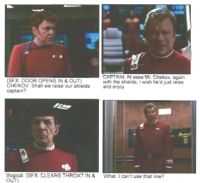 The ad ended: "For an HD picture
that can't be beat, get DIRECTV." Time Warner brought suit
for false advertising, and moved for a preliminary injunction. The
District Court found that ad's message was literally false
because it claimed that the DIRECTV picture quality was better than
HD cable picture quality (and it was not in fact better). In a
ruling that formally adopted the "false by necessary
implication" doctrine, the Second Circuit affirmed.
The ad ended: "For an HD picture
that can't be beat, get DIRECTV." Time Warner brought suit
for false advertising, and moved for a preliminary injunction. The
District Court found that ad's message was literally false
because it claimed that the DIRECTV picture quality was better than
HD cable picture quality (and it was not in fact better). In a
ruling that formally adopted the "false by necessary
implication" doctrine, the Second Circuit affirmed.
41. Columbia Pictures v. Fung (C.D. Cal. 2009). Columbia Pictures, along with other studios, brought copyright infringement actions against Gary Fung, the operator of a website that allegedly facilitated peer to peer file sharing of copyrighted works. The evidentiary record demonstrated that Fung had answered a user's questions about downloading episodes of Star Trek: Enterprise, and the Central District of California held that this was sufficient to give rise to secondary liability for materially assisting a direct infringer. The Ninth Circuit later affirmed.
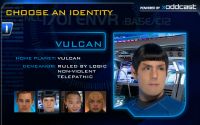 42. PixFusion v. Oddcast
Inc. (E.D. Tex. 2009). Pixfusion filed claims against
Oddcast and others, alleging infringement of its patented composite
imagery technology. Oddcast was allegedly using this technology
for, among other things, the com website, which allowed users to upload
their selfies and transform themselves into Vulcans or Romulans.
The case settled shortly after it was brought.
42. PixFusion v. Oddcast
Inc. (E.D. Tex. 2009). Pixfusion filed claims against
Oddcast and others, alleging infringement of its patented composite
imagery technology. Oddcast was allegedly using this technology
for, among other things, the com website, which allowed users to upload
their selfies and transform themselves into Vulcans or Romulans.
The case settled shortly after it was brought.
43. Riches v. Star Trek (E.D. Mo. 2009). Jonathan Riches, who the Court described as an inmate of a Federal Medical Center and a "well-known filer of frivolous lawsuits," filed a pro se complaint in 2009 against "Star Trek," naming as co-defendants several actors and fictional characters from the franchise. Riches, who claimed that he was really "Bernard Madoff," alleged among other things murder, unlawful sales of counterfeit space travel tickets on priceline.com, and that Spock gave him an ear infection when they were in prison together. The complaint was dismissed, joining dozens if not hundreds of others filed by Riches.
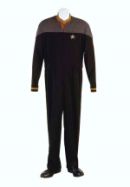 44. Moustakis v.
Christie's (N.Y. App. Div. 2009). Ted Moustakis
purchased a Commander Data uniform at a Star Trek memorabilia auction. When he found
out that the uniform was not one of a kind, he brought suit for
fraud against Christie's auction house. Moustakis reportedly spent about $20,000 at the auction,
but demanded $7 million in damages. The trial court found that,
despite the plaintiff's belief that the uniform was unique, no
such representation was made by Christie's, in the auction
catalogue or otherwise. The case was dismissed, and the New York Appellate Division affirmed.
44. Moustakis v.
Christie's (N.Y. App. Div. 2009). Ted Moustakis
purchased a Commander Data uniform at a Star Trek memorabilia auction. When he found
out that the uniform was not one of a kind, he brought suit for
fraud against Christie's auction house. Moustakis reportedly spent about $20,000 at the auction,
but demanded $7 million in damages. The trial court found that,
despite the plaintiff's belief that the uniform was unique, no
such representation was made by Christie's, in the auction
catalogue or otherwise. The case was dismissed, and the New York Appellate Division affirmed.
45. In re: Playmates Toys, Inc. (CARU 2010). The Children's Advertising Review Unit (CARU) of the Better Business Bureau took issue with certain Playmates television spots promoting the Star Trek Transporter Room and Bridge playsets, as well as a replica of the Enterprise. CARU found that the ads did not adequately disclose that the crew figures were sold separately, that batteries were not included and that assembly was required. Playmates, which had already stopped running the ad, stated that it would take CARU's opinion into consideration for future ads.
 46.
JohnsonPriceline.com (D.
Conn. 2012). Plaintiffs filed a putative class action law suit
alleging breach of fiduciary duty by Priceline.com. Plaintiffs
alleged that, in a series of "Priceline Negotiator"
television commercials, William Shatner had represented himself as
a Priceline travel agent acting in the consumer's best
interest, because Shatner "uses his seductive powers" and
threatens to "shake down" hotels for lower prices. But in
reality, Plaintiffs alleged, Priceline was acting only in its own
interest, keeping the difference between the "bid price"
offered by the consumer and the room rate charged by the hotel. The
Court held that commercials depicting Shatner
"acting" on behalf of Priceline customers did not create
a fiduciary relationship with those customers, and dismissed the
case.
46.
JohnsonPriceline.com (D.
Conn. 2012). Plaintiffs filed a putative class action law suit
alleging breach of fiduciary duty by Priceline.com. Plaintiffs
alleged that, in a series of "Priceline Negotiator"
television commercials, William Shatner had represented himself as
a Priceline travel agent acting in the consumer's best
interest, because Shatner "uses his seductive powers" and
threatens to "shake down" hotels for lower prices. But in
reality, Plaintiffs alleged, Priceline was acting only in its own
interest, keeping the difference between the "bid price"
offered by the consumer and the room rate charged by the hotel. The
Court held that commercials depicting Shatner
"acting" on behalf of Priceline customers did not create
a fiduciary relationship with those customers, and dismissed the
case.
47. Bouldin v. Colvin (M.D. Tenn. 2013). An Administrative Law Judge denied the plaintiff's application for Disability Insurance Benefits, the plaintiff appealed. As part of his appeal to the District Court, the plaintiff apparently offered his obsession with Star Trek as evidence of mental impairment. The Middle District of Tennessee rejected this argument in a statement that will come as a relief to parents of sci-fi convention attendees everywhere:
[T]he fact that the claimant collected Star Trek memorabilia into his 40s, while perhaps not the norm in rural Tennessee, is a hobby that literally tens of thousands, if not hundreds of thousands of people routinely engage in, as evidenced by the well-attended Star Trek conventions and brisk sales of Star Trek memorabilia on eBay. Some people even dress up as their favorite characters on Star Trek when attending the conventions. This does not establish they are mentally ill . . .
 48. Saldana v.
Britton (WIPO 2013). The domain name zoesaldana.com
was created sometime in 2002 just as actress Zoe Saldana was appearing in her first feature
films. In 2010, after she made it big as the young Uhura, the site was re-registered to Keith
Britton, Saldana's long-time boyfriend. In 2013, Saldana
filed a filed a UDRP domain name complaint, requesting that the
domain be transferred from Britton to her. Saldana claimed that,
although Britton registered the domain with her authorization, he
did so in bad faith because he was really just trying to take
control of Saldana's assets for himself. According to Saldana,
after the couple broke up, Britton was trying to sell the domain
for profit. Britton did not respond to the complaint, and the WIPO
panel ordered that the domain be transferred
to Saldana.
48. Saldana v.
Britton (WIPO 2013). The domain name zoesaldana.com
was created sometime in 2002 just as actress Zoe Saldana was appearing in her first feature
films. In 2010, after she made it big as the young Uhura, the site was re-registered to Keith
Britton, Saldana's long-time boyfriend. In 2013, Saldana
filed a filed a UDRP domain name complaint, requesting that the
domain be transferred from Britton to her. Saldana claimed that,
although Britton registered the domain with her authorization, he
did so in bad faith because he was really just trying to take
control of Saldana's assets for himself. According to Saldana,
after the couple broke up, Britton was trying to sell the domain
for profit. Britton did not respond to the complaint, and the WIPO
panel ordered that the domain be transferred
to Saldana.
49. UP Aerospace v. Knight (Conn. Super. 2014). Eric Knight was a founder and officer of UP Aerospace, a company that launches commercial and educational payloads into space. Knight fell out with the other founders and left in 2008, after which the parties entered into a settlement agreement limiting how Knight could represent his relationship to the company. One of the terms involved the launching into space of the ashes of James Doohan, who passed away in 2005. UP Aerospace thought the agreement prevented Knight from making any representation other than that he was "with the company" when Doohan's ashes were launched, whereas Knight thought that this was just an example of what he could say. In 2010 Knight published a book in which he described a speech he made to a "star studded audience" announcing that "my company would be flying the cremated remains of Scotty into space." According to the book, Knight then unveiled the rocket's nosecone and handed Sharpie markers to the celebrities who wanted to sign it. UP Aerospace claimed that the book violated the terms of the agreement and filed an action in Connecticut Superior Court. The Court held that the agreement was ambiguous as to what Knight was permitted to say, and refused to grant summary judgment to either side.
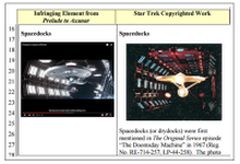 50. Paramount Pictures v.
Axanar, (C.D. Cal. 2016). In late 2015, Paramount
brought suit against the makers of an ambitious piece of fan
fiction called Axanar, a planned feature film set
during a fictional Klingon war that served as part of
the backstory for the original series. The defendant moved to
dismiss on the grounds that the plaintiff had not alleged with
sufficient specificity what was being infringed, but rather
referred only vaguely to the various fictional elements from the
Star Trek universe that would be incorporated into Axanar,
such as the Federation, the Starship Enterprise, and characters
like "Garth of Izar." In May 2016, the court
disagreed and denied the motion to dismiss, finding that
Paramount had sufficiently specified the infringed work (in fact,
Paramount's amended complaint was quite detailed). Several
days later, it was announced that Paramount
was dropping the suit, reportedly at the request
of producer JJ Abrams. However, as of this writing in July
2016, the docket indicates that the case is still active. The case
has attracted much attention, including this amicus brief from the Language Creation
Society, written partially in Klingon.
50. Paramount Pictures v.
Axanar, (C.D. Cal. 2016). In late 2015, Paramount
brought suit against the makers of an ambitious piece of fan
fiction called Axanar, a planned feature film set
during a fictional Klingon war that served as part of
the backstory for the original series. The defendant moved to
dismiss on the grounds that the plaintiff had not alleged with
sufficient specificity what was being infringed, but rather
referred only vaguely to the various fictional elements from the
Star Trek universe that would be incorporated into Axanar,
such as the Federation, the Starship Enterprise, and characters
like "Garth of Izar." In May 2016, the court
disagreed and denied the motion to dismiss, finding that
Paramount had sufficiently specified the infringed work (in fact,
Paramount's amended complaint was quite detailed). Several
days later, it was announced that Paramount
was dropping the suit, reportedly at the request
of producer JJ Abrams. However, as of this writing in July
2016, the docket indicates that the case is still active. The case
has attracted much attention, including this amicus brief from the Language Creation
Society, written partially in Klingon.
To view Foley Hoag's Trademark and Copyright Law Blog please click here
The content of this article is intended to provide a general guide to the subject matter. Specialist advice should be sought about your specific circumstances.
[View Source]

